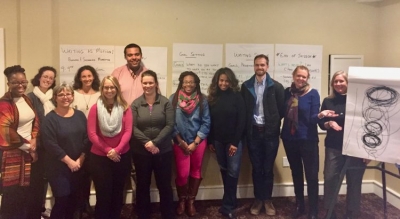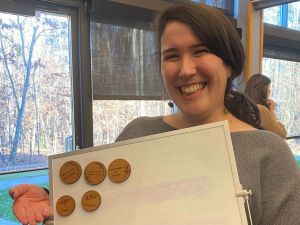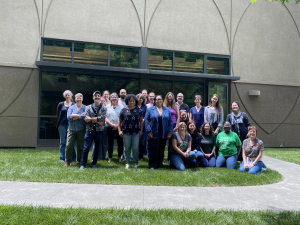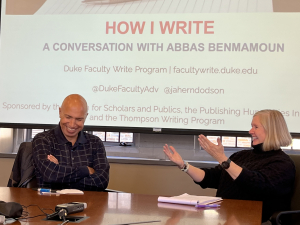Building and Sustaining Momentum as Engaged Scholars

“As scholars, we often find ourselves being asked to separate teaching from scholarship from service,” says Dr. Jennifer Ahern-Dodson, Assistant Professor of the Practice in the Thompson Writing Program and founder of the Faculty Write Program. The reality, however, is that all of those components are inextricably linked, as experience in one sphere enhances perspective in another. Recognizing this, Ahern-Dodson seeks to provide a space for faculty doing community-engaged work to take the time to thoughtfully integrate the many facets of their work and lives as scholars.
In pursuit of this mission, Ahern-Dodson held an Engaged Scholar Writing Retreat earlier this semester, an initiative co-sponsored by the Duke Forum for Scholars and Publics and the Faculty Write Program with support from North Carolina Campus Compact. On November 9, 19 scholars from five different universities across the state gathered at the King’s Daughters Inn for a day of writing and community building. Ahern-Dodson has been organizing and facilitating writing retreats since 2012, but upon being selected as a 2018-2019 Engaged Faculty Scholar by NC Campus Compact, she used the opportunity to convene faculty to talk specifically about building and sustaining momentum as engaged scholars.
The retreat was open to scholars across the state who are teaching an engaged pedagogy such as service-learning, community-based research, or participatory action research. With this theme at the center, the retreat was able to cultivate a supportive writing community while helping faculty identify and work through the challenges of engaged scholarship. Prior to the retreat, faculty shared a number of barriers to advancing their scholarship such as needing to carve out writing time, wanting to make writing a habit, wanting to make progress on a particular manuscript, or establishing a good co-writing process with collaborators. Throughout the day, participants were given blocks of writing time to focus on their scholarship, interspersed with short workshops and group discussions to address some of the identified challenges.
Dr. Michael Hemphill, Assistant Professor of Kinesiology at the University of North Carolina at Greensboro, found the practical tips shared during the retreat invaluable. “It feels like I’m learning things that I should have known forever,” he says, noting that he has already made copies of handouts which he intends to share with his own weekly writing group at UNCG and even with graduate students who are working on their dissertations. He envisions wide-ranging applications of the techniques he learned at the retreat and is eager to remain involved in future initiatives. Hemphill especially appreciates that a retreat of this kind, led by a scholar with specific expertise in writing strategy, truly “elevates the importance of this work and gives credence to the strategy behind writing”.
Dr. Rebecca Vidra, Director of the Duke Environmental Leadership Program and Program Director of DukeEngage in Kaua’i, also found herself adopting new strategies for sustaining the momentum of writing, like “parking on the downslope,” or leaving your writing with a note for what to do next. She attended the retreat with colleague Dr. Deborah Gallagher, Associate Professor of the Practice of Resource and Environmental Policy, so that they could work together on a collaborative manuscript about their work through Bass Connections and DukeImmerse.
Ahern-Dodson plans to continue the dialogue into the spring semester with another statewide retreat and continued cultivation of an engaged scholar network at Duke. Even beyond these specific initiatives, the seeds planted at the retreat have prompted participants to reaffirm their commitment to structured writing and to seek out writing groups within their local networks. The retreat was just one component of a much larger conversation for engaged scholars.
This article originally appeared at The Office for Civic Engagement.



